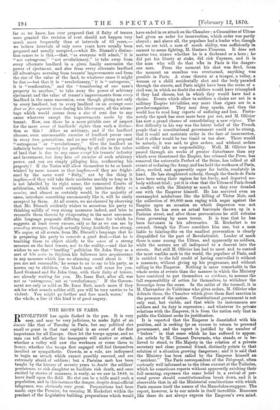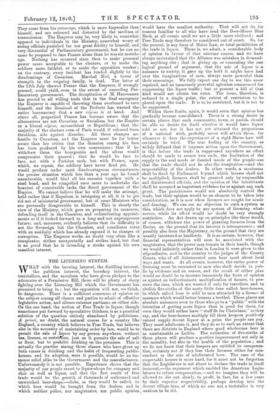THE RIOTS IN PARIS.
REVOLUTION has again flashed in the pan. It is very easy, and may be very judicious, to make light of an imeute like that of Tuesday in Paris, but any political riot small or great in that vast capital is an event of the first importance for all Europe. Once let the troops appear, and no man can tell whether the insurgents will scatter or attack, whether a volley will cow the workmen or rouse them to frenzy, whether the troops first engaged will feel themselves insulted or sympathetic. Crowds, as a rule, are indisposed to begin an attack which cannot possibly succeed, and are extremely afraid of soldiers ; but a Parisian mob has been taught by the history of seventy years to doubt the soldiers' persistence, to risk slaughter as duellists risk death, and once excited by stories of massacre, is ready, as we saw in 1848, to leave itself upon the field. No riot can be a trifle amid such a population, and in this instance the danger, despite demi-official telegrams, was obviously very• great. Preparations had been made, says the Premier, for rescuing M. Rochefort within the precinct of the Legislative building, preparations which would have ended in an attack on the Chamber ; a Committee of Ultras had given an order for insurrection, which order was partly obeyed ; and above all, the populace had a leader who, though not, we are told, a man of much ability, was sufficiently is earnest to mean fighting, M. Gustave Flourens. It does not matter two straws whether he is a firebrand or a hero ; he did put his liberty at stake, did risk Cayenne, and it is the man who will do that Who in Paris is the danger- ous man. From the moment his shot was fired, from the moment an omnibus was overturned, anything was possible in Paris. A stone thrown at a trooper, a volley, a. woman or a child accidentally shot and the body paraded through the streets, and Paris might have been the scene of a. civil war, in which no doubt the soldiers would have triumphed if they had chosen, but in which they would have had a. choice. Events which allow to soldiers a choice are not in a. military Empire trivialities, any more than cigars are in a powder-magazine. They may drop sparks, and then the- world has to read long reports of suffering and loss. Fortu- nately the spark has once more been put out, and M. 011ivier has now a grand chance of consolidating a new regime. The first difficulty in his way was the latent belief of the French, people that a constitutional government could not be strong, that it could not maintain order in the face of insurrection,. that it either would be too timid or too slow. There would be nobody, it was said, to give orders, and without orders soldiers will take no responsibility. Well, M. 011ivier has passed through six weeks of greater disturbance than any which ever threatened the Empire, has released the Press, has removed the autocratic Prefect of the Seine, has talked at all events of reducing the Army, and has held the workmen of Paris, alive, excited, and apparently eager for battle, resolutely in hand. He has slaughtered nobody, though the Garde de Paris have been using their rapiers far too freely, and deported no- body without trial ; yet it is clear that the Ultras of Paris dread a conflict with the Ministry as much as they ever dreaded one with the Emperor himself. He has survived even an unexampled misfortune like the killing of Victor Noir, and the collection of 80,000 men raging with anger against the Empire upon an occasion on which dispersion was not possible, he has seen an actual barricade thrown up in a Parisian street, and after these provocations he still refrains from governing by mere terror. It is true that he has been fortunate in his adversaries. M. Rochefort is no- coward, though the Times considers him one, but a man liable to fainting-fits on the smallest provocation is clearly- disqualified for the part of Revolutionist. Leader of mark there is none among the Ultras, and apparently no soldiers, while the orators are all indisposed to a descent into the streets. But still M. 011ivier has had to meet and to control the most warlike mob in the world, the populace of Paris, and is entitled to the full credit of having controlled it without a massacre, without giving up his programme, and without calling in the Emperor. Nothing is more remarkable in the- whole series of events than the manner in which the Ministry have contrived to put themselves en evidence, to assume the- full responsibility of action for themselves, to withdraw the- Sovereign from the scene. In the midst of the turmoil, it is M. Chevandier de Valdrome who gives orders, M. 011ivier who defends them, the Chamber which gives them final sanction in the presence of the nation. Constitutional government is not only real, but visible, and that while its instruments are soldiers and its duty is repression ; and whatever its private relations with the Emperor, it is from the nation only that in public the Cabinet seeks its justification.
It is reported that the Emperor is dissatisfied with his position, and is seeking for an excuse to return to personal government, and the report is justified by the number of " feelers " in that sense which he has suffered to appear. An article by M. Clement Duvernois, who stands, or is be- lieved to stand, to His Majesty in the relation of a private secretary and close personal friend, distinctly points to that solution of a situation growing dangerous ; and it is said that the Ministry has been called by the Emperor himself an " accident." The Paris correspondent of the Telegraph, often curiously well informed as to the ideas current at the Tuileries, which he sometimes reports without apparently catching their full meaning, expresses the same belief in a revival of per- sonal power should constitutionalism break down, and it is observable that in all the Ministerial combinations with which Paris amuses itself the names of the Mamelukes reappear. The report, however, is to our minds in itself incredible. Rumours like these do not always express the Emperor's own mind. They come from his entourage, which is more Imperalist than himself, and are coloured and distorted by the medium of transmission. The Emperor may be, very likely is, somewhat opposed to individuals in the Ministry, somewhat weary of seeing officials punished for too great fidelity to himself, and very distrustful of Parliamentary government, but he can no more be prepared to face France alone than he was six months ago. Nothing has occurred since then to make personal power more acceptable to the electors, or to make the soldiers more faithful, or to make the opposition weaker ; on the contrary, every incident has tended slightly to the disadvantage of Cassarism. Marshal Niel, a tower of strength to the reigning family, is dead. The letter of the 12th July showed France that the Emperor, if strongly pressed, could yield, even to the extent of conceding Par- liamentary government. The decapitation of M. Haussmann has proved to all willing tools that in the final emergency the Emperor is capable of throwing them overboard to save himself, and the dismissal of the Prefects has warned the entire bureaucracy that a new regime is at hand. And above all, propertied France has become aware that the alternatives are not Owsarism or Socialism, but the Empire or a liberal regime, monarchical or Republican ; that the majority of the electors even of Paris would, if released from thraldom, side against disorder. All these changes are hostile to Caasarism, and the Emperor must be far better aware than his critics that the disunion among his foes has been produced by his own concessions ; that if he withdrew them the bourgeoisie and the ultras would compromise their quarrel ; that he would be face to face, not with a Parisian mob, but with France, upon which, we repeat, the soldiery have never fired yet. He would produce under most disadvantageous circumstances the precise situation which less than a year ago he found unendurable, would bind all his enemies together with a steel bond, and be compelled once more to undertake the heaviest of conceivable tasks, the direct government of the Empire. We cannot believe that he will make the attempt, hold rather that if Napoleon is intriguing at all, it is to get rid not of ministerial government, but of some Ministers who are personally disagreeable to himself. This is clearly the view of the Ministry, which goes on preparing its measures, defending itself in the Chamber, and redistributing appoint- ments as if it looked forward to a long and not unprosperous future; and, moreover, evidently believes that its difficulty is not the Sovereign but the Chamber, and conciliates votes with an assiduity which has already exposed it to charges of corruption. The Emperor works no doubt very often like a conspirator, strikes unexpectedly and strikes hard, but that is no proof that he is intending a stroke against his own manifest interest.



































 Previous page
Previous page